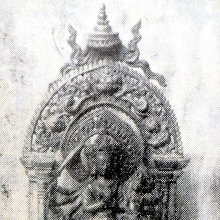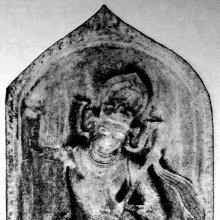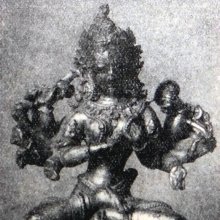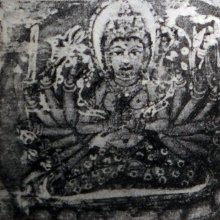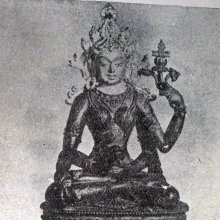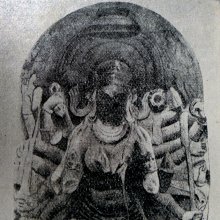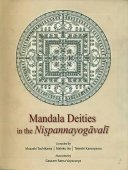Abhayakaragupta, Abhayākaragupta, Abhayakara-gupta: 6 definitions
Introduction:
Abhayakaragupta means something in Buddhism, Pali, Hinduism, Sanskrit, the history of ancient India. If you want to know the exact meaning, history, etymology or English translation of this term then check out the descriptions on this page. Add your comment or reference to a book if you want to contribute to this summary article.
Images (photo gallery)
In Buddhism
Tibetan Buddhism (Vajrayana or tantric Buddhism)
Source: Brill: Śaivism and the Tantric Traditions (tantric Buddhism)Abhayākaragupta (अभयाकरगुप्त) is the author of the Vajrāvalī, a text within Tantric Buddhism dealing with construction manual for monasteries etc.—Tantric Buddhism also produced a number of manuals which are closely comparable to Śaiva Pratiṣṭhātantras and Paddhatis. Of these, three manuals are particularly rich in information: the Kriyāsaṃgrahapañjikā of Kuladatta, the Vajrāvalī of Abhayākaragupta, and the Ācāryakriyāsamuccaya of Jagaddarpaṇa or Darpaṇācārya, which incorporates much of the Vajrāvalī but adds some new materials (Sanderson 2009, 126–127, note 293).
Source: MDPI Books: The Ocean of HeroesAbhayākaragupta (अभयाकरगुप्त) is the author of the Jyotirmañjarī: an elaborate homa manual.—Abhayākaragupta composed the discourse on the forms of fire pits in the external homa section of his Jyotirmañjarī, particularly relying on the chapter of the external homa ritual (Chapter 48) in the Vajraḍāka. It seems that Jayasena used Abhayākaragupta’s Jyotirmañjarī because the Ḍākārṇava did not include a discourse that expounded ways to prepare and perform the external homa ritual in detail. Abhayākaragupta is also known as the author of the Āmnāyamañjarī, an extensive commentary on the Sampuṭodbhava.

Tibetan Buddhism includes schools such as Nyingma, Kadampa, Kagyu and Gelug. Their primary canon of literature is divided in two broad categories: The Kangyur, which consists of Buddha’s words, and the Tengyur, which includes commentaries from various sources. Esotericism and tantra techniques (vajrayāna) are collected indepently.
India history and geography
Source: Wikipedia: India HistoryAbhayākaragupta (अभयाकरगुप्त) (11th century AD) was a Buddhist monk, scholar and tantric master (vajrācārya) and the abbot of Vikramaśīla. He was born in the city of Gaur, West Bengal, in Eastern India, and is thought to have flourished in the late 11th-early 12th century CE, and died in 1125.
Abhayākaragupta’s magmum opus, the Vajravāli, is a “grand synthesis of tantric liturgy” which developed a single harmonized tantric ritual system which could be applied to all Tantric Buddhist mandalas.

The history of India traces the identification of countries, villages, towns and other regions of India, as well as mythology, zoology, royal dynasties, rulers, tribes, local festivities and traditions and regional languages. Ancient India enjoyed religious freedom and encourages the path of Dharma, a concept common to Buddhism, Hinduism, and Jainism.
Languages of India and abroad
Sanskrit dictionary
Source: Cologne Digital Sanskrit Dictionaries: Edgerton Buddhist Hybrid Sanskrit DictionaryAbhayākaragupta (अभयाकरगुप्त).—name of an author: Sādhanamālā 579.12.
[Sanskrit to German]
Sanskrit, also spelled संस्कृतम् (saṃskṛtam), is an ancient language of India commonly seen as the grandmother of the Indo-European language family (even English!). Closely allied with Prakrit and Pali, Sanskrit is more exhaustive in both grammar and terms and has the most extensive collection of literature in the world, greatly surpassing its sister-languages Greek and Latin.
See also (Relevant definitions)
Partial matches: Gupta, Abhayakara.
Full-text (+350): Vajravali, Nishpannayogavali, Mahastamaprapta, Sarvanivaranavishkambhin, Sagaramati, Sarvapayanjaha, Bhadrapala, Akshayamati, Pratibhanakuta, Jaliniprabha, Gaganaganja, Apayanjaha, Sarvashokatamonirghatamati, Amritaprabha, Jnanaketu, Gandhahastin, Amitaprabha, Candraprabha, Amoghadarshin, Maitreya.
Relevant text
Search found 6 books and stories containing Abhayakaragupta, Abhayākaragupta, Abhayakara-gupta, Abhayākara-gupta; (plurals include: Abhayakaraguptas, Abhayākaraguptas, guptas). You can also click to the full overview containing English textual excerpts. Below are direct links for the most relevant articles:
The Indian Buddhist Iconography (by Benoytosh Bhattachacharyya)
Figure 87 - Mañjuśrī Mañjuvajra
Figure 125 - Emanations of Akṣobhya: Heruka
The Catu-Bhanavara-Pali (critical study) (by Moumita Dutta Banik)
Paritta and Tantra < [Chapter 1 - Introduction]
Stupas in Orissa (Study) (by Meenakshi Chauley)
Blue Annals (deb-ther sngon-po) (by George N. Roerich)
Chapter 10 - Origin of the Adamantine Garland (Vajrāvali) and other cycles < [Book 14 - Great Compassion Cycle]
Chapter 3 - Defense of the Teaching by Ma Lotsawa, Zhama, and her brother < [Book 4 - New Traditions of Secret Mantra]
Chapter 3 - Guhyasamāja-tantra system of Jñānapāda < [Book 7 - The preaching of the Tantras]
Reverberations of Dharmakirti’s Philosophy (by Birgit Kellner)
Bodhisattvacharyavatara (by Andreas Kretschmar)
Related products
